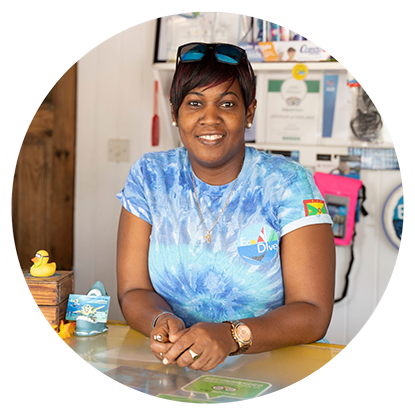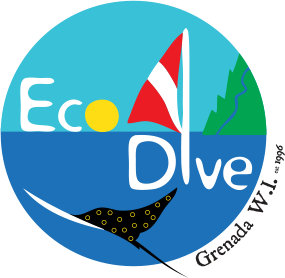Frequently Asked Questions
Got a question?
We have provided some general facts and information about Grenada, as well as some frequently asked questions about some of the services we offer at Eco Dive. If your question is not listed here in FAQs or covered on our webpage, please do not hesitate to contact us for more information. The information outlined below is subject to change without notice. Please always check for the latest page update.

General FAQs on Grenada
A three-island nation located in the Eastern Caribbean, Grenada has approximately 100,000 inhabitants and is the most southern of the Windward Islands.
Grenada and its two sister islands (Carriacou and Petite Martinique) are blessed with beautiful lush green vegetation and mountain top, acres of land covered with fragrant spice trees and rare tropical flowers. Bordered by stunning beaches, and dotted with beautiful towns, this island major source of export is nutmeg, cloves, ginger, cinnamon, vanilla and cocoa. It is why Grenada second most popular name is the ‘Isle of Spice.’
In the interior of this volcanic island are rainforests watered by cascading rivers and waterfalls as well as one of the most stunning mountain lakes, the Grand Etang. The capital, St. George’s, is widely held to be the most picturesque city in the Caribbean. Softly colored dockside warehouses and red-tiled roofs of traditional shops, surround its horseshoe-shaped harbor.
The island is ringed with miles of picture-perfect strands, including both entrancing black and sugar-fine white sand beaches. Grand Anse Beach, a smooth expanse stretching for two miles around the curve of a gentle bay, is world famous. Grenada has plenty to offer those interested in offshore pleasure as well, with easily accessible and pristine reefs off the coast of both Grenada and its sister island, Carriacou.
For more information, please visit www.puregrenada.com
Its dramatic history and vibrant cultural heritage couples Grenada’s natural splendor. First sighted by Colombus in1498, Grenada was already inhabited by the Carib and the Arawak; settlement by Europeans occurred much later when the British tried to establish a toehold in 1609 but were chased off. In 1650 the French came ashore with booze to sooth the fierce Caribs and bought extensive land for beads and knives.
For the next 90 years the French and the English battled for possession of the island. In 1877 Grenada became a Crown Colony and in 1967 an associate state within the Commonwealth before gaining independence in 1974 with Eric Gary. In 1979 an attempt was made by the late Maurice Bishop to set up a socialist/communist state. Then, in 1983, a faction within Bishop’s ruling New Jewel Movement put Bishop under house arrest and was eventually executed with several aides. Today Grenada is a peaceful country and is experiencing many new developments and positive changes.
Local festivals, fairs, and markets remain an integral part of life on Grenada. Its centuries-old spice plantations and rum distilleries still use traditional methods, emphasizing quality rather than quantity. The tourist industry has become more substantial in recent years. The island’s easy lifestyle and the warmth of its friendly Grenadian people evoke an atmosphere that has long gone elsewhere.
The three islands of Grenada, Carriacou & Petite Martinique are located in the eastern Caribbean at the southern extremity of the Windward Islands, only 100 miles north of Venezuela. To the north lie St. Vincent and the Grenadines and to the south lie Trinidad and Tobago.
Average temperatures range from 75F to 85F (24C to 30C), tempered by the steady and cooling trade winds. The lowest temperatures occur between November and February. Due to Grenada’s remarkable topography, the island also experiences climate changes according to altitude. The driest season is between January and May. Even during the rainy season, from June to December, it rarely rains for more than an hour at a time and generally not every day.
Approximately 103,000 people inhabit Grenada, including the 6,000 inhabitants of Carriacou and the 1000 residents of Petite Martinique. The nations citizens are primarily of African, East-Indian and European descent, with the largest proportion of the population, approximately 75%, of African descent. Grenada is an English-speaking nation.
With direct flights from Europe the United Kingdom and United States, Grenada is more accessible than ever to make it your #1 travel destination. Flights travel directly to Grenada can be booked from Frankfurt – Germany, London – England and multiple hub locations (i.e. JFK, MIA, ATL and CTL) in the U.S.
Daily Tours
Eco Dive is located on Grand Anse Beach in the Coyaba Beach Resort. We also have a satellite office located in Port Louis Marina in St. George’s town.
Both locations are conveniently located and can be accessed by car, public transportation, or walking if staying in the Grand Anse area. Pick-ups and drop-offs can be arranged, if booked in advanced and depending on availability.
Probably much less than you think. Based on your daily tour bookings or reservations, what you need to bring may vary.
For snorkelers, all equipment is provided and included in the cost of your tour. Obviously, if you have any of your own personal equipment that fits and works for you, you’re are more than welcome to bring it along. Drinking water is provided on the boat. Bring a towel and maybe some reef safe sunscreen wouldn’t hurt as well. But most importantly bring your smile.
For scuba divers, rental equipment is available and will be based on your bookings. You will need to bring swimwear, a towel, sunscreen and for our friends from colder climates who find our temperate Caribbean water too warm for a wetsuit maybe a t-shirt or rash guard to wear under your scuba gear.
Snorkeling
Bring your snorkeling gear if you have it(mask, snorkel, and fins), sunscreen, a towel, and a waterproof camera if you wish to take photos or video. Don’t worry about the gear, Eco Dive Grenada will provide you with the snorkeling equipment you’ll need, including floatation devices 🙂
You can expect to see a variety of fish, coral, and other marine creatures that have made the sculptures their home. Common sightings include parrotfish, angelfish, and damselfish.
No, absolutely not! All snorkelers are given floatation vests to wear and our sea water is very buoyant, keeping swimmers and snorkelers effortlessly on the surface to enjoy the view.
On the calm ‘Caribbean Sea’ side of Grenada the chances of seeing a shark while snorkeling are small. So small in fact that one has never been reported on a snorkeling tour. The fish and turtles are harmless on all counts however will come close enough for that perfect Instagram moment.
Our snorkelling sites have been specially selected by our team and are tried and tested so you have the best experience possible. Whether snorkelling on the Reefs of Flamingo Bay and Dragon Bay or in the worlds first underwater sculpture park at Molinere Point the bottom will never be more than 25ft \ 9m away.
Scuba Diving
Eco Dive divers can begin their underwater adventure at just 8 years old in the swimming pool with PADI Bubblemaker Programme and 10 years old in the ocean. There is no upper age limit for diving however all divers should be in good physical health. If you have medical concerns please contact your medical doctor and ask them about your status and diving.
Yes, certification is generally required to go scuba diving. This is to ensure that you have the necessary knowledge and skills to dive safely and responsibly.
However, if you’re new to scuba diving and want to try it out before committing to a full certification course, Eco Dive Grenada offers introductory experiences like the PADI Discover Scuba Diving program. This allows you to dive under the direct supervision of a PADI Professional without needing full certification. For those who wish to dive regularly and explore the underwater world more freely, we recommend completing one of our certification courses, such as the PADI ‘Scuba Diver’ Course or the PADI ‘Open Water Diver’ Course.
Divers need to wait 12 hours after a single dive before getting on an airplane. However, there is no limit for coming off a plane into the sea. If you have questions about your schedule please ask our friendly Eco Dive team.
At Eco Dive Grenada, we offer two initial PADI dive certifications for new divers, each with different durations:
- PADI ‘Scuba Diver’ Course: This is the first certification level for new divers and takes approximately 2 days to complete. It is a shortened version of the full PADI ‘Open Water Diver’ Course and includes dive theory with review and assessments, confined water (pool) training, and open water (ocean) training dives. Upon completion, divers are certified to dive anywhere in the world with a dive professional to a depth of 12m (40ft). This course is ideal for holiday divers who want to enjoy shallow dives or for Junior Divers (ages 10 through 14) as a stepping stone towards the full certification.
- PADI ‘Open Water Diver’ Course: This is the first full scuba certification level and is taught by our highly-trained PADI Instructors in a relaxed, supportive learning environment. By the end of the course, you’ll have the skills and knowledge to dive independently at home or abroad and be an ambassador for the underwater world.
Both courses can be shortened by completing the theory portion online. Ask us how you can get started online, at our dive shop, or both!
Absolutely! Going with a friend or family member for your first breaths underwater or working toward a scuba diving certification together can make the experience even better. Also means you’ll have a dive buddy from day 1.
Being able to swim is certainly not a disadvantage, however for the Discover Scuba Diving experience there is no swimming component involved. The main focus is on you being safe and having fun. If you decide that you would like to take your diving to the next level and undertake a ‘PADI Scuba Diver’ or ‘Open Water’ course there is a 200m-swim test and a 10-minuet survival float.
